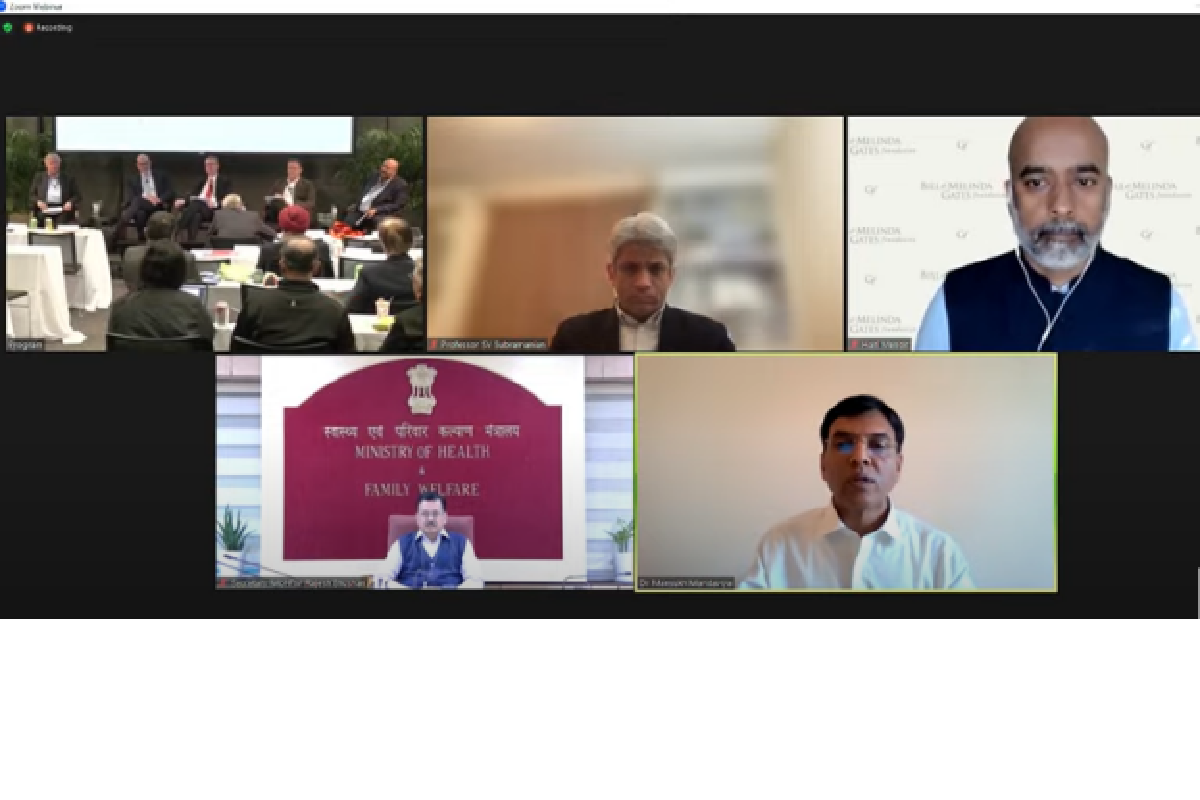[ad_1]

New Delhi: Dr Mansukh Mandaviya, Union Minister for Health and Family Welfare in a virtual address at the ‘The India Dialog‘ session on the Economic Impact of Vaccination & Related Matters shared that much before the World Health Organisation declared COVID-19 a public health emergency, India had put in place processes and structures to focus dedicatedly on various facets of pandemic management. India also adopted a ‘Whole of Government’ & ‘Whole of Society’ approach in a proactive, preemptive & graded manner thus adopting a holistic response strategy, for effective management of COVID-19. The dialogue was organised by Institute for Competitiveness and US-Asia Technology Management Centre, Stanford University.
He also released the working paper by Stanford University and Institute for Competitiveness titled ‘Healing the Economy: Estimating the Economic Impact on India’s vaccination and related issues”. The paper discusses the role of containment as a measure to prevent the spread of the virus. It highlights that, as against the top-down approach, a bottom-up approach was critical in containing the virus. Moreover, the Stanford report remarkably notes that robust measures at the ground level, like contact tracing, mass testing, home quarantine, distribution of essential medical equipment, revamping healthcare infrastructure, and constant coordination among stakeholders at the centre, state, and district levels, not only helped contain the spread of the virus but also in augmenting the health infrastructure.
It elaborates on the three cornerstones of India’s strategy – containment, relief package, and vaccine administration. It observes that these three measures were critical in saving lives and ensuring economic activity by containing the spread of COVID-19, sustaining livelihoods, and developing immunity against the virus. The working paper further notes that India was able to save more than 3.4 million lives by undertaking the nationwide vaccination campaign at an unprecedented scale. As per the working paper, the vaccination campaign was always on saving lives. However, it also yielded a positive economic impact by preventing the loss of $18.3 billion. A net benefit of $15.42 billion occurred for the nation after taking into consideration the cost of the vaccination campaign.
Praising the countrymen’s efforts, Dr Mandaviya credited a large part of the success to the citizens who cooperated with the government and other stakeholders in the fight against COVID. Hailing the decision of early lockdown by the Prime Minister as a significant turning point, Dr Mandaviya alluded that it enabled the government to leverage community response in its five-pronged strategy to combat COVID-19 namely Test-Track–Treat–Vaccination-Adherence for implementing covid appropriate behaviour (CAB) and delivering a rapid and robust institutional response.
Reiterating the need for robust cooperation among stakeholders, Dr Mandaviya said, “Government focused on augmenting health infrastructure in terms of covid related beds, drugs, logistics ie, N-95, PPE kits and medical oxygen, simultaneously up-skilling human resources through centres of excellence and deploying digital solutions such as eSanjeevani Telemedicine service, Aarogya Setu, COVID-19 India Portal etc.” Equal weightage was given to scaling up the testing infrastructure at an unprecedented rate exceeding the superlative figure of 917.8 million tests conducted. Additionally, a network of 52 labs for genomic surveillance were established for monitoring emerging variants of the virus, he further added.
Dr Mandaviya further stated, “Building on this momentum, India launched the world’s biggest vaccination drive, garnering a coverage of 97 per cent first dosage and 90 per cent of the second dosage, administering 2.2 billion dosages in all for eligible beneficiaries. Campaigns and digital tools such as ‘Har Ghar Dastak’, mobile vaccination teams as well as the inception of Co-Win vaccine management platform were leveraged to ensure last-mile delivery.”
A defining factor in the success of pandemic management was allaying fears, managing misinformation and infodemic in the community through targeted information, education and communication, he further added.
The report reflected that the benefits of vaccination exceeded its cost and suggested that vaccination be considered a macroeconomic stabilising indicator contrary to just a health intervention. “The cumulative lifetime earnings of the lives saved through vaccination (in the working age group) tolled up to $21.5 billion”, highlighted the working paper. As per the Stanford University report, “the development of all these vaccines (COVAXIN & Covishield) helped the country fight the pernicious attack of the virus and not only inoculate a large number of people but also decrease the burden on the healthcare system.”
Hailing the relief packages for citizens, Dr Mandaviya stressed, “A constant coordination among stakeholders at the centre, state, and district levels, was observed which not only helped mitigate the adverse effects of COVID-19 but also provided an impetus to the economic activities.” The relief package by the government catered to the welfare needs of vulnerable groups, old age population, farmers, micro, small & medium enterprises (MSMEs), and women entrepreneurs amongst others and also ensured support for their livelihoods. “With the help of schemes launched to support the MSME sector, 10.28 million MSMEs were provided assistance resulting in an economic impact of $100.26 billion which comes out to be about 4.90 per cent of the GDP.”
Ensuring food security during the pandemic, Dr Mandaviya informed everyone about initiatives like Pradhan Mantri Garib Kalyan Ann Yojana (PMGKAY) which has also been highlighted in the working paper. According to the report, the government focused on ensuring that no one slept hungry & free food grains were distributed to 800 million people which resulted in an economic impact of approximately $26.24 billion. Additionally, the launch of PM Garib Kalyan Rozgar Abhiyan helped in providing immediate employment & livelihood opportunities to migrant workers. Through the scheme, four million beneficiaries were provided employment which resulted in an overall economic impact of $4.81 billion. This provided livelihood opportunities and created an economic buffer for citizens, the working paper points out.
Dr Mandaviya appreciated the efforts of the entire team of researchers & subject matter experts behind this report & urged everyone to go through it to understand the magnitude of the economic impact brought about by our key strategies against the COVID-19 crisis. This will help stakeholders to arm themselves against future pandemics.
Rajesh Bhushan, Union Health Secretary highlighted the agility of the country’s response and decision-making which were scientifically backed and evidence-based, along with the strong political will. This ensured that the government strategies could encompass the diversity of the nation as well, successfully aligning its response to the fast-changing situations. Considering that almost all Covid vaccines are indeed disease-modifying vaccines and not disease-preventing vaccines, he further recommended that the study may be elongated in a longitudinal aspect to incorporate finer nuances of elements like hospitalisation rates and other factors.
The working paper released was authored by Dr Amit Kapoor, Lecturer, Stanford University and Dr Richard Dasher, Director, US-Asia Technology Management Centre, Stanford University. Keynote speakers such as Hari Menon, Director-India Country Office, BMGF emphasised that India successfully pioneered a vaccination drive that prioritised healthcare workers and citizens and managed it on a huge magnitude of scale and diversity. Echoing these sentiments, Dr SV Subramanian, Professor, Harvard TH Chans School of Public Health, Harvard University said, “The nimbleness of the Covid vaccination drive is impressive, particularly as it bears no historical precedence”. He further added that this can be extended to children’s vaccination as well. Dr Mark Esposito, Professor, Hult Int’l Business School & Harvard University’s Division of Continuing Education added that India is a rising player with a flourishing bioscience and biopharma sector in its keep. This feat has set an example for the world and its strategies can be applied to address other pertaining issues around the globe. Professor Richard Dasher informed the participants about the resilience shown through various initiatives taken during the Covid period. One such spending estimate being $280 billion (as per IMF) through direct and indirect funding had a positive impact on the economy and helped build state government capacities.
[ad_2]
Source link
